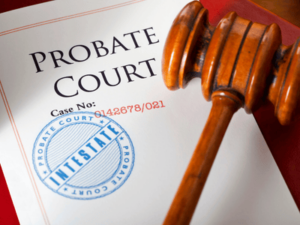Losing a loved one is never easy, and handling their affairs can be overwhelming, especially if they didn’t leave behind a will. In Texas, when someone passes away without a will, their assets are subject to intestate succession—a legal process that distributes the deceased’s property according to state law. Navigating probate in Texas without a will can be complex, but understanding each step can make it more manageable. In this guide, we’ll walk you through the essential information you need to face probate in Texas without a will, including who inherits what, how to appoint an administrator, and potential options to simplify the process.
Understanding Intestate Succession in Texas
When someone dies without a will, they are said to have died “intestate,” which means their assets will be distributed according to Texas intestate succession laws. These laws determine who inherits property based on the deceased person’s surviving relatives and family relationships. While intestate succession aims to distribute assets fairly, it may not reflect the exact wishes the deceased might have had.
Order of Inheritance in Texas:
-
Married with Children:
Texas law divides assets between a surviving spouse and children. The rules for this division depend on whether the assets are considered community property (property acquired during the marriage) or separate property (assets acquired before marriage or by gift/inheritance).
- Community property typically goes to the surviving spouse if the deceased’s children are also the spouse’s children. If the deceased has children from a previous relationship, community property is divided between the spouse and the children.
- Separate property is split between the spouse and children, with specific shares depending on the type of property (real estate vs. personal property).
-
Unmarried with Children:
When an unmarried person with children dies, all assets are inherited equally by their children.
-
No Children or Spouse:
If there is no spouse or children, inheritance may pass to parents, siblings, nieces, nephews, and potentially more distant relatives.
Special Situations:
- Stepchildren typically do not inherit unless they were legally adopted.
- Children from previous marriages or relationships are entitled to inherit from their biological parent’s estate, even if their parent remarried.
For a detailed breakdown of intestate succession laws in Texas, refer to this Texas Law Help guide.
Appointing an Administrator for the Estate
In cases where there is no will, the court will appoint an administrator to manage and distribute the estate. This person serves a similar role to an executor but without the direction of a will.
Who Can Be an Administrator?
- Texas law gives preference to certain relatives when appointing an administrator, usually starting with the spouse, adult children, or other close family members.
- If there are disputes among family members about who should serve as administrator, the court will ultimately decide based on the best interests of the estate.
Process for Appointing an Administrator:
- Step 1: A family member (or another interested party) files an application with the county probate court where the deceased resided.
- Step 2: The court holds a hearing to determine who will serve as the administrator, giving preference to close relatives.
- Step 3: If selected, the administrator may need to post a bond to ensure they act responsibly with the estate’s assets.
For more information on Texas probate laws, you can visit the Texas State Law Library.
Steps in the Texas Intestate Probate Process
Once an administrator is appointed, the Texas probate process follows specific steps to manage and distribute the estate’s assets.
Step 1: File for Probate
To start the probate process, an application must be filed in the probate court of the county where the deceased person resided. Filing should be done as soon as possible, as Texas law requires probate to begin within four years of death.
- Why This Matters: Failing to initiate probate within the four-year window can complicate or prevent the distribution of assets.
Step 2: Court Appointment of Administrator
During the probate process, the court officially appoints an administrator and issues letters of administration, granting them the authority to handle the estate. These letters allow the administrator to access financial accounts, property titles, and other assets for inventory and management.
Step 3: Inventorying and Appraising Assets
The administrator is responsible for compiling a full inventory of the deceased’s assets, including both personal and real property. Assets might include bank accounts, real estate, vehicles, and personal belongings. For valuable property, an appraisal may be required to determine fair market value.
- Purpose of the Inventory: The inventory ensures all assets are accounted for and allows the court to see the value of the estate for accurate distribution.
Step 4: Identifying and Notifying Heirs
The administrator must identify and notify all known heirs, as well as potential creditors. Notification allows heirs to participate in the probate process and creditors to file claims against the estate, if applicable.
- Court’s Role: If there are unknown or distant relatives, the court may require additional steps to locate them, which can sometimes delay the process.
Step 5: Paying Debts and Taxes
Before any assets are distributed, the administrator must use estate funds to pay outstanding debts, including taxes, medical bills, and other liabilities. Texas law requires all creditors to be paid first before heirs can receive their inheritance.
- Why This Matters: Outstanding debts must be resolved to avoid legal issues and ensure fair distribution to heirs.
Step 6: Distributing Remaining Assets to Heirs
Once debts and taxes are resolved, the administrator can distribute the remaining assets according to Texas intestate succession laws. This final distribution closes the probate process and transfers ownership of assets to the heirs.
Challenges and Potential Delays in Probate Without A Will
Navigating probate without a will can be complex, and several issues may arise, causing delays and additional challenges:
- Disputes Among Heirs: Disagreements over inheritance can prolong probate, especially if family members disagree on the division of assets.
- Creditor Claims and Debts: Creditors have the right to file claims against the estate, which can reduce the assets available for heirs and extend the probate timeline.
- Finding Unknown Heirs: When the deceased has distant or unknown heirs, the court may require efforts to locate them, adding time and potential expense to the process.
- Costs of Probate: Legal fees, court fees, and appraisal fees can significantly reduce the inheritance available to heirs, making it essential for families to prepare for these costs.
For more on managing potential probate challenges, visit this resource on Texas probate issues.
Alternatives to Court-Supervised Probate for Small Estates
Texas offers some options to simplify the probate process for smaller estates or estates with limited assets.
- Small Estate Affidavit: This option allows heirs to bypass full probate for estates valued under $75,000 (excluding homestead value). It requires meeting specific criteria, including minimal debts and no real estate outside the homestead.
- For more details, check out this Texas Small Estate Affidavit Guide.
- Muniment of Title: When the deceased has no debts other than a mortgage, the court can issue an order transferring the title of real estate without full administration.
- This option is useful for transferring property quickly and avoiding the lengthy probate process when specific conditions are met.
How to Avoid Intestate Probate in Texas
If you’re going through probate without a will, now is an excellent time to consider setting up a plan to avoid it for your own estate. Here are some effective steps:
- Create a Legally Valid Will: Having a will is one of the simplest ways to ensure your wishes are honored and to prevent your family from dealing with the complexities of intestate probate.
- Update Beneficiary Designations: Name beneficiaries on life insurance, retirement accounts, and bank accounts to ensure these assets transfer directly, bypassing probate.
- Consider Setting Up a Trust: Trusts allow assets to pass to beneficiaries without going through probate. This can help simplify the process and offer significant tax benefits.
To learn more about creating a will and other estate planning tools, visit our Estate Planning Services page.
Take Control of Your Family’s Future with a Proper Plan
Navigating probate in Texas without a will can be complex, but understanding each step can make the process more manageable for you and your loved ones. While Texas has procedures in place for distributing assets, they may not align with what your loved one would have wanted. Planning ahead with a will or trust can ensure that your family doesn’t face these difficulties.
Ready to protect your family’s future? Contact Hailey-Petty Law Firm today to discuss estate planning options that make the process easier on those you love. By creating a comprehensive plan, you can avoid the stress and complexity of probate, giving your family peace of mind for years to come.


